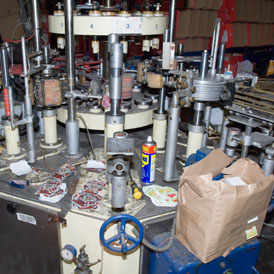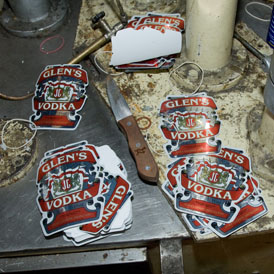Alcohol-making gear found at Boston blast site
As Lincolnshire police find equipment used for distilling alcohol at the site of an explosion in Boston in which five people were killed, Channel 4 News asks how widespread such practices are.
Reports had been circulating that Wednesday’s explosion in the Broadfield Lane industrial estate unit was caused by an illegal vodka distillery. Lincolnshire Police Supt Keith Owen said initial searches revealed evidence that supports the rumours.
“What I can confirm is that we have found chemicals on the premises which tend to indicate either the manufacture or production of alcohol,” he said.
The explosion caused a fireball that left five people dead and another hospitalised. Fire officials described it as “so intense” that people could hear it five miles away.
The hospitalised man was so badly disfigured by the explosion that he had no recognisable features, a police spokesman told Channel 4 News.
Supt Owen said: “Our main target now is to identify who the six men are, and then to contact their families.
“At this stage we don’t know who these people are.”
Following Wednesday’s blast, Boston residents told reporters that men of eastern European origin had been brewing vodka in the industrial unit.
According to government statistics, a quarter of Boston’s 70,000 population is foreign, with 30 per cent of those being Polish, 18 per cent Lithuanian and 10 per cent Latvian.

Many eastern Europeans come to Boston every year to take up manual jobs like fruit picking, and washing potatoes and peas.
A spokesman from the Department for Customs and Revenue said that in the period since 2005, HMRC have seized nearly 15 million litres of alcohol with a taxable value of over £33m and issued demands for more than £175m of evaded duty.
However, he added that most illegal alcohol is smuggled, predominantly from Eastern Europe, rather than being the product of illegal distilleries.
Two weeks ago, Lincolnshire police raided six stores in Boston and discovered bottles of counterfeit vodka containing cleaner fluid.
Forensic tests found the seized vodka contained isopropyl, a chemical used in solvents and cleaning fluid.
Sgt Jock Watt, from Lincolnshire Police’s licensing team, said at the time: “(This) sends out a clear signal that operating in this way will not be tolerated in Boston, or indeed across Lincolnshire.”

On Monday, six members of a London bootlegging gang who used high-tech equipment to turn out 24 fake bottles of vodka per minute were jailed for more than 56 years.
The gang made more than 1.3 million litres of the illegal vodka in a warehouse in Hackney, east London, avoiding £16m in duty and VAT.
Polish workers, brought to the UK solely to work in the warehouses, were housed in filthy on-site accommodation, enabling the gang to run a 24/7 operation.
In north London the gang used sophisticated equipment which produced 9.5 tonnes of counterfeit hand-rolling tobacco at the rate of 100 pouches per minute, valued at £800,000 in duty.
And earlier this month, customers in Bolton were warned by police to be wary of counterfeit bottles of vodka after a woman claimed she needed hospital treatment after drinking illegal spirits.